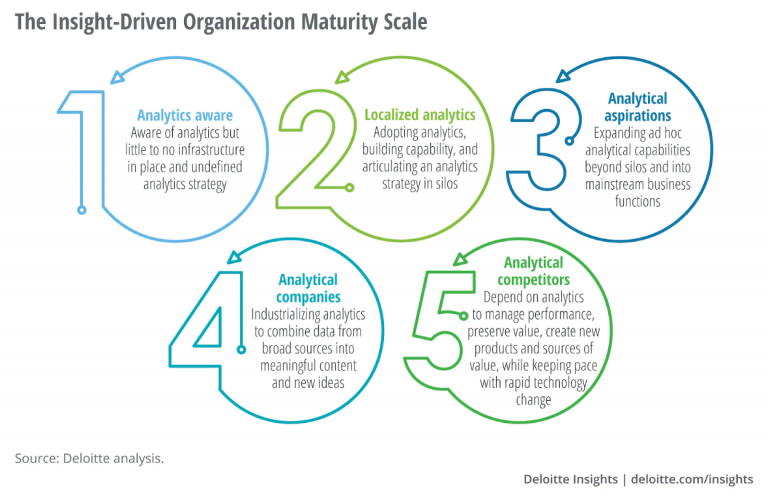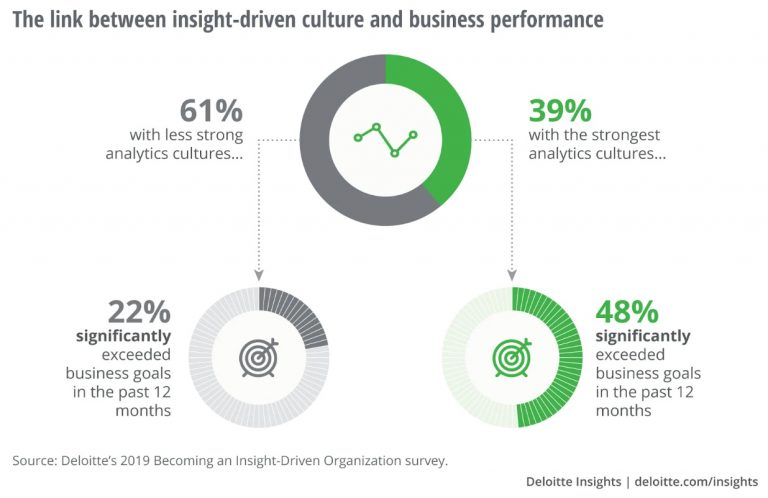
Most companies believe data is key to their operations. However, even though most executives agree that data is essential, only some leverage the full potential of business intelligence.
Data integration between applications and systems rapidly reduces the time it takes to implement business processes, significantly increasing the value created by a company over other competitors. However, technological and business changes impose significant pressure on every company.
Business consultants can help companies mature their operations effectively by analyzing their transitions and providing recommendations. Doing this helps reduce the harmful effects of growing pains experienced by companies as they progress up the BI Maturity model.

Advantages of moving up the BI maturity model
As we level up the BI Maturity Model, we gain many valuable advantages. Technology consulting helps to maximize the benefits and minimize the time of the transition. The following list details what your company can achieve with the right support from experienced consultants.
Bring all relevant data together
Finding out what data companies and organizations collect is crucial to gaining valuable insights. Information can come from APIs, flat files, databases, CRMs, ERPs, and portals. Modern data connectors help you gather and centralize all your disparate data sources, making it easy to identify trends, perform cross-analysis and take action based on data alone. By connecting each process, disparate data sources become one cohesive whole that people can easily access. Completing this task requires a high level of data intelligence.
Equip teams with self-service analytics
Self-service business intelligence software gives businesses a competitive edge by reducing the need to ask their IT department for reports. This way, each employee in a company equipped with this software is more capable and knowledgeable in data analytics, which frees up the IT department to focus on other tasks. Additionally, this software reduces the resources and time the IT department spends gathering reports.
Pass down predictive analytics to users
Individuals with any level of expertise can utilize well-set-up predictive analytics. Business professionals can easily integrate forecast engines into their workflows to create future scenarios for which to gather data. Doing this allows them to adjust their current strategies for the best possible results. Artificial intelligence can alert you to changes in a company’s physical or financial state through intelligent data, allowing you to reduce the time you need to perform routine tasks by automating processes and completing routine.
Eliminate unnecessary manual tasks
BI software automatically performs processes with fewer steps and no need for static designs or spreadsheets. Instead, it utilizes modern apps that eliminate the need for rows and columns. For example, a KPI dashboard created by software updates itself with real-time data. Entirely automated reports can be made within specified time intervals. Create an easy dashboard that lets you interact with your data by simply dragging and dropping values for a more intuitive way to analyze your data.
Reduce downtime to zero
Software-as-a-Service options provide companies with a whole business intelligence experience. This can be achieved through tools that store all data in a secure online environment, adjust to a company’s specific needs, and scale or de-scale accordingly. On-demand self-service analytics through a cloud platform lets you access any data at any time of the day. Consultants, analysts, data scientists, or managers can access data relevant to their position and perspective. You only need a browser and an internet connection to access your data on any smart device.
Centralize data storage
Data stored in one location is business intelligence, or the process of pooling different databases and systems to gather reports, analytics, and trends. Many large companies have multiple systems that track data, including enterprise resource planning (ERP) systems, customer relationship management (CRM) software, and more. Any organization that stores data needs tools to organize it into reports and insights using specific criteria.
Forecast future events
Many businesses use advanced intelligence systems to predict future events and forecast the performance of their products. These systems analyze historical data and current information to provide insight into a product’s performance history and anomalies, enabling users to make informed decisions instead of reacting to changes randomly.
Generate insightful reports automatically
Many business intelligence tools are automated, making it easy to produce reports on specific products or collect data over a particular period. Many of these tools can also automatically create visualizations for use in presentations.

What steps to take to move up the BI Maturity model?
Data management isn’t just a task performed by software. Instead, businesses need to implement specific protocols and procedures for change management to achieve business intelligence goals. Business intelligence is about accessing and utilizing data— both are crucial for success. When implementing advanced data analytics and using data proactively, the overall success of a business increases significantly. Because of this, enterprises perform much better when they understand their data’s trustworthiness and how their systems produce business intelligence.
Understanding your company’s analytics progress and using data more efficiently are practical first steps to becoming more mature. The following list can help start things off.
Find out who has access to your current data and any technical tools or sources used to create the data. Then determine your current analytical maturity level and use that information for the next steps.
It’s important to research other data sources, including data gathered from both the company’s internal and external sources. It’s also essential to create and track key performance indicators or KPIs to monitor performance, collect customer feedback, and encourage positive change within the company. Additionally, using website analytics tools is important, and doing so helps track the outcomes of any decisions or changes made by the company.
When deciding which metrics to monitor, consider why they’re important and how they can help you answer specific questions. Instead of just focusing on “how many” metrics, choose ones that provide information about “why” and “how” something is done. This will help you answer questions like “why do my customers behave the way they do?” and “how can I predict their behavior next?”
It’s important to share data across departments in a simplified manner by implementing agile practices. Additionally, you should ensure all relevant parties have access to the data. Give employees access to data so they can brainstorm new ideas and develop expertise using it.
Consider the intended end users when purchasing data analytics tools. In particular, consider the non-technical staff when choosing tools that are easy to use and provide clear reports. Additionally, it is recommended to buy technology that can harness data and get value out of it
Combining new technology and capabilities with institutional knowledge is necessary to ensure ongoing trends are incorporated.
Conclusion
Data can provide an enormous competitive advantage if used correctly. By analyzing data, professionals can better understand their clients, react faster to market changes and discover new development opportunities. It also helps you make smarter decisions and detect new development opportunities.
Adding BI expertise to your team helps you use the application to its fullest potential. Whether you’re just starting or already working at the highest level of BI development, we can provide expert guidance that suits your needs. This comes from practical advice from our professionals and is aligned with your team’s expertise.
At Itirra, we provide companies with customized solutions and opportunities to explore potential improvements to support their business goals. For a personalized recommendation based on your unique business model, don’t hesitate to get in touch or schedule a meeting with me.

